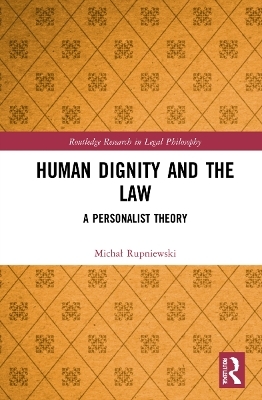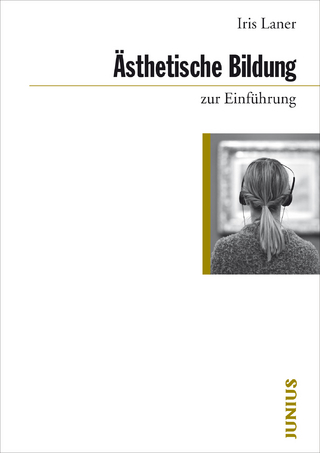
Human Dignity and the Law
Routledge (Verlag)
978-1-032-18075-5 (ISBN)
This book reassesses the relationship between human dignity, law, and specifically the ‘personalist’ school of agency.
The work argues that a specific way of appreciating dignity is contained in how law understands the person, and so can be used to improve upon how we explain and interpret the law. Despite considerable differences between jurisdictions as regards human dignity in application, it is argued that the particular weight of human persons is the widely shared focal point. The central claim, therefore, is that the law recognises, and tries to foster, the status of personhood, and, drawing on the work of Karol Wojtyła, the author develops a ‘Status of Personhood Theory’.
The book will be of interest to academics and researchers working in the areas of Legal Philosophy, Jurisprudence, Philosophy, Ethics and Political Theory.
Michał Rupniewski is Assistant Professor (adiunkt) at the University of Lodz, Faculty of Law and Administration, Department of Political and Legal Doctrines, Poland. He is Associate at the Alexis de Tocqueville Centre for Political and Legal Thought, Poland. Professor Rupniewski has participated in courses and stipends at the universities of Bonn, Strasbourg, and Fordham. He served as guest lecturer at the Universidad Panamericana in Mexico City. His chief scholarly interest is political philosophy’s influence on legal interpretation and legislation. In particular, he specialises in political liberalism, personalism, human dignity and law, as well as in theory of legal change.
Preface
Acknowledgements
Outline
Chapter 1. Methodological credentials of human dignity in the law
Chapter 2. Philosophy: the personalist conception of human action and respect proper to persons
Chapter 3. Law: the status of personhood and the dignitarian moment
Chapter 4. Politics: institutions and the status of personhood
1 Methodological credentials of human dignity in the law
Introduction
1 Three methodological commitments as a point of departure
1.1 The prima facie function of human dignity
1.2 The problem of consensus and metaphysical parsimony in law
1.3 Law and reality
2 Defining and explicating human dignity in the law
2.1 The questions of definition
2.2 The rules of explication
3 The dignitarian moment in the law
3.1 The foundational function
3.2 The regulative function
3.3 The heuristic function
3.4 The meta-legal level
3.5 Toward interpretation of the dignitarian moment
Conclusion
2 Philosophy: the personalist conception of human action and affirmation proper to persons
Introduction
1 Mapping personalism: the Personalist Postulate
2 Securing personalism: empirical basis and empirical relevance
3 Ontology: human action as the actus personae
3.1 Self-determination and vertical transcendence
3.2 Self-possession and self-governance as the experiential component of human freedom
3.3 Reference to truth as the condition of transcendence and fulfilment: the role of integration
4 Normativity: affirmation of persons
4.1 The personalist value of the actus personae and dignity of the person
4.2 The moral duty: source, content, and structure of moral judgement
Conclusion
3 Law: the status of personhood and the dignitarian moment
Introduction
1 The suppositum humanum in legal inquiries
1.1 The ‘praxiological’ and the ‘ethical’ interpretation of human dignity in the law
1.2 The praxiological reading and the autonomy of human dignity in the law
2 The realism of the SPT: the ontological referral and reflective equilibrium
3 Human dignity as the status of personhood
3.1 Dignitarian legal interests of the human person
3.2 The Principle of the Status of Personhood as an explication of human dignity in the law: the status of personhood as a status-expressing principle
3.3 The Principle of the Status of Personhood, wide reflective equilibrium, and the issue of explaining the dignitarian moment in the law
Conclusion
4 Politics: institutions and the status of personhood
Introduction
1 The status of personhood, participation, and the idea of decent law
1.1 The Principle of the Status of Personhood and genuine participation
1.2 Decency of law and the public order
2 Normative indeterminacy and the principles of adjudication
2.1 Basic assumptions concerning adjudication
2.2 The personalist meaning to equal dignity
2.3 Hard cases and easy cases: toward a theory of error
3 Decent law, social engineering, and the principles of legislation
3.1 Toward dignitarian unity of a legal system: legal personhood
3.2 Legislative standards for decent law and the threats of ‘law as engineering’
Conclusion
Philosophical conclusions
Jurisprudential conclusions
Political conclusions
Information on the Alexis de Tocqueville Centre of Political and Legal Thought
Index
| Erscheinungsdatum | 21.07.2022 |
|---|---|
| Reihe/Serie | Routledge Research in Legal Philosophy |
| Zusatzinfo | 1 Tables, black and white; 1 Line drawings, black and white; 1 Illustrations, black and white |
| Verlagsort | London |
| Sprache | englisch |
| Maße | 156 x 234 mm |
| Gewicht | 512 g |
| Themenwelt | Geisteswissenschaften ► Philosophie |
| Recht / Steuern ► Allgemeines / Lexika | |
| Recht / Steuern ► EU / Internationales Recht | |
| ISBN-10 | 1-032-18075-7 / 1032180757 |
| ISBN-13 | 978-1-032-18075-5 / 9781032180755 |
| Zustand | Neuware |
| Haben Sie eine Frage zum Produkt? |
aus dem Bereich


